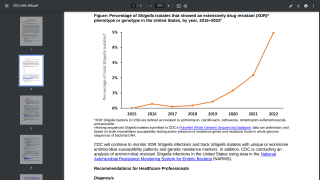A Shift in Shigellosis Cases Highlights Vaccine Need

The World Health Organization (WHO) says Shigellosis, a gastrointestinal infection caused by one of four species of Shigella bacteria, continues to pose a significant public health problem, even in major cities.
Researchers recently reported in Clinical Infectious Diseases an increase in severe, multidrug-resistant (MDR) shigellosis cases in Vancouver, Canada, and a shift in these patient demographics.
Published on November 21, 2024, these researchers observed a substantial increase in severe Shigellosis and a shift from sexually transmitted S. sonnei infections in men who have sex with men (MSM) to likely environmental transmission among people experiencing homelessness (PEH).
Specifically, the 3.6.1.1.2 clone of MDR S. sonnei in PEH was associated with a more severe disease, which could be due to the underlying vulnerabilities of the affected population.
This retrospective review of 163 patients with S. sonnei infections was undertaken from 2015 to 2022. During this period, S. sonnei infections rose from 8.3 cases/year (historical period) to 56.5 cases/year (recent period).
Over time, the primary population characteristics of Shigellosis shifted from MSM (45 98%) to PEH (86,77%).
Severe Shigellosis was significantly higher in the recent compared to the historical period (69 [61%] versus 7 [14%], p<0.001).
Furthermore, the susceptibility of S sonnei to oral antibiotics has also decreased significantly during the recent period. MDR was present in only 11 (22%) of historical isolates, compared with 109 (96%) from the recent period.
This new data indicates an acceleration of these outbreaks.
A U.S. CDC health advisory posted in 2023 said extensively drug-resistant Shigella infections were 5% of Shigella infections reported in 2022 compared with 0% in 2015.
Although sexual transmission is well-established in MSM, this study's authors say transmission among PEH in Vancouver is likely occurring following exposure to fecally contaminated environmental surfaces and hands.
In the United States, the CDC estimates about 450,000 cases of Shigellosis occur annually, making it the third most common bacterial enteric disease. As of week #44, ending November 2, 2024, the CDC confirmed 18,002 Shigella cases, led by California (L.A., 3,864) and New York (2,647).
In 2023, the CDC reported 17,176 cases in the U.S.
To combat this unfortunate trend, Valneva SE and LimmaTech Biologics AG are co-developing Shigella4V (S4V), a tetravalent bioconjugate vaccine candidate against Shigellosis. In October 2024, the U.S. FDA granted Shigella4V Fast Track designation, which indicates that this vaccine's development is a high priority.
Our Trust Standards: Medical Advisory Committee








